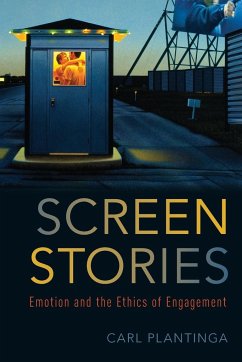The way we communicate with each other is vital to preserving the cultural ecology, or wellbeing, of a place and time. Do we listen to each other? Do we ask the right questions? Do we speak about each other with respect or disdain? The stories that we convey on screens, or what author Carl Plantinga calls 'screen stories, ' are one powerful and pervasive means by which we communicate with each other. Screen Stories: Emotion and the Ethics of Engagement argues that film and media studies needs to move toward an an approach to ethics that is more appropriate for mass consumer culture and the lives of its citizens. Primarily concerned with the relationship between media and viewers, this book considers ethical criticism and the emotional power of screen stories that makes such criticism necessary. The content we consume--from television shows and movies to advertisements--can significantly affect our welfare on a personal and societal level, and thus, this content is subject to praise and celebration, or questioning and even condemnation. The types of screen stories that circulate contribute to the cultural ecology of a time and place; through shared attention they influence what individuals think and feel. Plantinga develops a theory of the power of screen stories to affect both individuals and cultures, asserting that we can better respond ethically to such media if we understand the sources of its influence on us.
Hinweis: Dieser Artikel kann nur an eine deutsche Lieferadresse ausgeliefert werden.
Hinweis: Dieser Artikel kann nur an eine deutsche Lieferadresse ausgeliefert werden.








